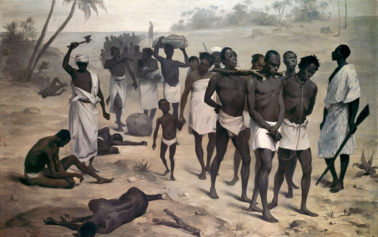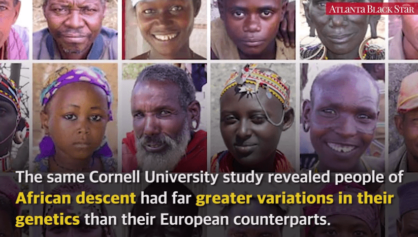A recent genetic study revealed that many African-Americans have genomes that are nearly a quarter European, which could have major medical implications and tells the story of America’s colonial past.
The discovery came after researchers from 23andMe, a massive database that collects genetic information, sifted through roughly 500,000 profiles.
This is considered one of the largest data sets to ever be used for research on population mixing.
The results of the research are not surprising to many in a country that has been deemed a “melting pot,” but it does provide new numerical data representing the way different cultures mixed.
For many African-Americans, it also means they have European roots that they may have never even considered before.
Katarzyna Bryc, a population geneticist at 23andMe who is also the lead author of the study, said the average African-American genome was more than 70 percent African and 24 percent European.
Roughly 4 percent of the Europeans in the database carried African ancestry.
Bryc says the findings support the idea that cultural mixing was extremely common in early U.S. history.
“It suggests that really early U.S. history may have been a time of a lot of mixture,” Bryc said, according to Sciencemag.org.
Certainly the narrative that accompanied American slavery, when white slaveowners with European lineage routinely impregnated enslaved women to expand their property, speaks directly to the “cultural mixing.”
Researchers were able to see the genetic impact historical events had on Americans’ lineage.
Bryc points to the fact that Oklahoma had the highest amount of African-Americans with significant Native American ancestry.
Back in 1830, the U.S. forced Native Americans out of their own land and into Oklahoma, an event that would later be deemed the “Trail of Tears.”
“You can really see historical events and historical migrations in the genetics,” Bryc said. “We weren’t actually expecting to be able to see that as clearly as we do.”
There are also serious medical implications from the study.
The diverse genetics of African-Americans is something Bryc said needs to be considered seriously in the medical field.
There are certainly assumptions some doctors may make based on a patient’s race but an African-American patient may have “underlying genetics” that don’t “necessarily correspond” to that of other Black patients.
There are also medical implications for Europeans as well.
While Black people are the main carriers of sickle cell, the new study suggests that European Americans could be carrying the sickle cell variant as well.
The study also analyzed Latino ancestry and revealed that the average Latino genome is 18 percent Native American and more than 65 percent European.


